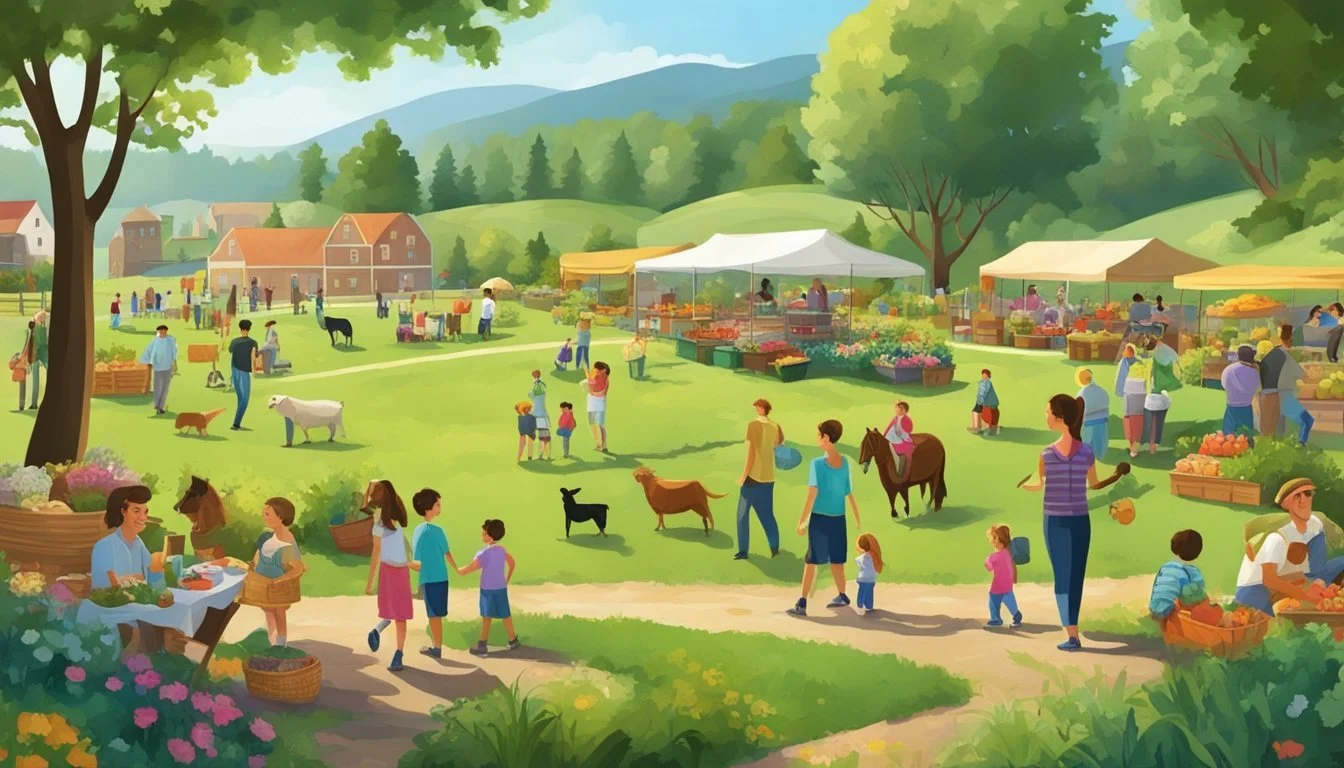Agritourism in Georgia
Exploring the Peach State's Rustic Charm
Agritourism in Georgia represents a growing intersection between the state's robust agricultural heritage and its burgeoning tourism industry. Georgia's diverse landscape is conducive to a variety of farming activities, offering visitors a chance to experience the pastoral side of life through hands-on activities, educational tours, and farm-to-table dining. As the state's top economic sectors, agriculture and tourism naturally blend to create a platform for immersive experiences ranging from u-pick fruit farms to vineyard tours, reflecting Georgia's rich agricultural tapestry.
The concept of agritourism is not just about leisure; it plays a critical role in supporting rural communities and economies by increasing farm income, creating jobs, and revitalizing local markets. Visitors to Georgia can expect to be a part of rural traditions and contemporary farming practices by engaging directly with farmers and producers. Seasonal events, such as harvest festivals, agricultural fairs, and farmers markets, add to the charm and appeal of Georgia's agritourism, inviting tourists to deepen their understanding of where their food comes from and the skill it takes to produce it.
By drawing urban dwellers and tourists into rural areas, agritourism fosters a connection between the consumer and the origin of their food, promoting sustainability and awareness. Georgia's agritourism initiatives encourage exploration of both rural and urban farms and agribusinesses, highlighting the state's commitment to agricultural innovation and community involvement. Through agritourism, Georgia not only showcases its agricultural prowess but also strengthens the bond between producer and consumer, providing a vital link in the journey from farm to fork.
Understanding Agritourism
Agritourism in Georgia is a flourishing synergy between the state's vast agricultural landscape and its growing tourism sector. This blend of activities provides educational and economic benefits to both visitors and the community.
Historical Background
Agritourism has roots in the traditions of agricultural communities sharing their way of life with others. In Georgia, agriculture is of paramount importance, historically serving as the backbone of the state’s economy and community structure. Agritourism has emerged as a bridge between the past and the present, inviting visitors to experience Georgia's rich agricultural heritage firsthand, while also contributing to its contemporary growth.
Agritourism Operations
Agritourism operations in Georgia encompass a variety of activities that engage visitors in agricultural experiences. These operations range from farm visits, where guests can pick their own produce, to tours of processing facilities. Educational components often include demonstrations of farming techniques and information about the lifecycle of farm products. Agribusinesses integrate tourism by combining these experiences with hospitality services, such as lodging and local cuisine, thus creating a comprehensive agritourism package that benefits the local community through increased visitor spending and job creation.
By providing these connections to the agrarian world, agritourism also serves an educational purpose, increasing public awareness about the sources of their food and the challenges of agriculture.
Exploring Georgia's Farms
Georgia’s scenic beauty is not just in its landscapes but also in its thriving farm heritage. Tourists can experience this heritage first-hand through the variety of farm tours and the blend of organic and traditional agriculture practices.
Farm Tours
Georgia offers a myriad of farm tours where visitors can immerse themselves in the day-to-day workings of authentic farming operations. One can find experiences ranging from Lasso the Moon Alpaca Farm to the diverse offerings at Pettit Creek Farms, including animal parks and specialized event facilities. Farm tours provide an opportunity to understand agricultural processes and engage with local agribusinesses.
Examples of Farm Tours:
Lasso the Moon Alpaca Farm
Pettit Creek Farms
Farm tours not only contribute to the state's agritourism but also allow visitors to establish a connection with the state's agricultural roots.
Organic and Traditional Agriculture
The agriculture in Georgia is a blend of both organic and traditional farming techniques. This combination caters to a diverse consumer base and supports sustainable practices. Various farms across the state have adapted to organic methods, offering tours and opportunities to educate the public on the benefits of organic farming. Additionally, traditional agriculture remains strong, reflecting Georgia's long-standing farming culture and practices.
Agriculture Practices:
Organic: Focus on sustainable and chemical-free farming practices.
Traditional: Utilization of conventional farming methods honed over generations.
Whether it is through exploring organic farms or experiencing the continuing traditions of family farming, Georgia provides a comprehensive agricultural journey to its visitors.
Agritourism Activities
Agritourism in Georgia offers a plethora of activities that blend fun and education, providing visitors with a taste of farm life and the state's agricultural heritage. From navigating the twists of corn mazes to embracing the tranquility of farm stays, visitors can engage in a range of authentic experiences.
Corn Mazes and Pumpkin Patches
Corn mazes are a staple of Georgia's agritourism, offering an engaging way to learn about agriculture while having fun. During the autumn months, families and groups can immerse themselves in the challenge of twisty paths cut through fields of towering corn. Pumpkin patches complement the fall experience, with visitors flocking to farms to pick fresh pumpkins straight from the vine. These activities not only provide entertainment but also teach about crop cycles and seasonal farming.
Locations for Corn Mazes and Pumpkin Patches:
Petit Creek Farms: Hosts annual corn mazes and allows visitors to choose the perfect pumpkin for Halloween.
Other Notable Sites: Often, local farms advertise their seasonal events closer to autumn through local tourist websites and agriculture associations.
Farm Stays and Educational Tours
Farm stays invite visitors to experience rural life firsthand by staying overnight on a working farm. This immersive experience often includes participating in daily chores, learning about sustainable farming practices, and enjoying fresh farm-to-table meals. Educational tours provide insights into the workings of a farm, including livestock care, planting and harvesting. They are ideal for visitors interested in a deeper understanding of where their food comes from and the life of farmers.
Options for Farm Stays and Educational Tours:
Farm B&Bs and Inns: Offer comfortable lodgings with an educational twist.
Day Tours: Many farms provide guided tours that highlight their operations and sustainable practices.
Agritourism in Georgia offers a vast array of activities that are sure to provide both fun and educational experiences for visitors of all ages. Whether it's through hands-on experiences like corn mazes and farm stays or through informative tours that detail the journey from farm to table, visitors leave with a greater appreciation for Georgia's agricultural heritage.
Local Products and Markets
Georgia's agritourism allows visitors to experience the state's rich agricultural heritage through its local products and markets. These venues serve as a platform for farmers and artisans to sell Georgia-grown, fresh, and handcrafted products directly to the consumer, fostering a connection between the land and local communities.
Farmers Markets
Farmers markets in Georgia are vibrant community hubs where locally-sourced produce and products are available. The Farmers Market Guide provided by the Georgia Department of Agriculture evidences that consumers can find everything from ultra-fresh produce to pastured meat and eggs, and artisan cheeses.
Georgia Grown: This program promotes local agribusinesses and markets.
Vibrant Hub: Farmers markets function as lively meeting places where consumers indulge in the freshest Georgia has to offer.
Boutiques & Specialty Shops
Boutiques and specialty shops across the state place a high value on offering unique, Georgia-grown items that reflect the local culture and agriculture. They often house a curated collection of hand-harvested honey, handmade crafts, and artisanal products perfect for visitors seeking an authentic Georgian experience.
Handcrafted Goods: A focus on small-batch, Georgia-made products.
Local Culture: Shops that reflect the agricultural and artisanal heritage of the region.
Georgia Wine and Brew Trails
Georgia's agritourism is not just about traditional farms. It includes a rich experience of wineries, breweries, and distilleries, complemented by specialized trails and tours that guide visitors through the state's beverage craftsmanship.
Wineries, Breweries & Distilleries
Georgia's climate and soil conditions are conducive to vineyards that produce a variety of wines, attracting visitors to the picturesque regions where these vineyards thrive. The state boasts over 600 jobs tied to wineries and vineyards, with an economic contribution surpassing $81.6 million. This indicates a thriving sector that's ripe for tourism.
Wineries: Visitors can explore the vine-covered landscapes that produce local wines. From small boutique wineries to larger operations, each offers a taste of Georgia's unique flavors.
Breweries: Georgia's craft beer scene has seen remarkable growth. Breweries across the state offer tours and tastings, showcasing their hop-centric endeavors.
Distilleries: The distilleries in Georgia produce an array of spirits, from traditional bourbons to unique fruit-infused liquors, all reflecting the state's diverse agriculture.
Wine and Brew Tours
Tours present an educational and enjoyable method to experience Georgia’s wine and brew culture. The pathways provide scenic views and an intimate understanding of the production process, from grain to glass.
Trails & Tours: Agritourism trails such as Georgia Grown Trails 17 and 37 highlight the state's commitment to showcasing its agricultural offerings. Along these trails, one can encounter a variety of agritourism hotspots including wineries, breweries, and distilleries.
Tours: Companies like Atlanta Food Walks offer curated cultural tours where the exploration of local beverages is a significant component. These tours often combine historical insights with tasting opportunities, thus offering a well-rounded visitor experience.
Outdoor Recreational Activities
Georgia's agritourism extends beyond farms and ranches, showcasing rich state parks and a multitude of natural attractions geared towards outdoor enthusiasts. They offer ample opportunities for fishing, camping, and hiking, providing a variety of ways to immerse oneself in nature's beauty.
State Parks and Natural Attractions
Georgia's state parks serve as a cornerstone for outdoor recreation. Visitors can explore Amicalola Falls State Park, home to the tallest cascading waterfall in the Southeast. The park offers breathtaking views and numerous trails for all skill levels. Another highlight is Cloudland Canyon State Park, which presents rugged geology and offers vistas of sheer canyons and dense woodland.
Popular State Parks in Georgia:
Amicalola Falls State Park
Cloudland Canyon State Park
Vogel State Park
These parks often encompass additional features such as tranquil lakes and picnic areas, ideal for family outings or solitary retreats.
Fishing, Camping, and Hiking
Georgia's natural settings provide a sanctuary for fishing aficionados, with lakes well-stocked with bass, trout, and catfish. Lake Lanier and Lake Hartwell are two of the state's premier fishing destinations.
For camping enthusiasts, options abound within both state parks and privately owned campgrounds. Facilities range from primitive sites to those offering full RV hookups, ensuring every level of outdoor comfort can be found.
Favorable Hiking Trails:
Appalachian Trail (extending from Springer Mountain)
Pine Mountain Trail (at F.D. Roosevelt State Park)
Whether one seeks the thrill of a challenging hike or the serenity of fishing, Georgia's natural landscape caters to a spectrum of outdoor recreational activities.
Cultural and Historical Highlights
Georgia's agritourism offers a window into the state's storied past, with a rich tapestry of museums and Civil War landmarks interwoven with verdant gardens, arboretums, and historic plantations. Visitors have the opportunity to walk through living history and natural beauty that capture the essence of Georgia's heritage.
Museums and Civil War Sites
Georgia’s agritourism is deeply connected to its historical narrative, particularly the Civil War. Key locations such as heritage farms showcase artifacts and exhibits relevant to this era. Civil War sites are peppered across the state, allowing for immersive tours that recount the stories and battles that shaped the nation.
Andersonville National Historic Site: This site houses the National Prisoner of War Museum and preserves the former Camp Sumter, a Confederate prisoner-of-war camp during the Civil War.
Atlanta History Center: Offers comprehensive Civil War exhibits, including the famous Battle of Atlanta cyclorama painting.
Gardens, Arboretums, and Plantations
Georgia's historical plantations and contemporary gardens provide a glimpse into the agricultural practices and ornamental horticulture of the past and present. Gardens and arboretums highlight regional flora and emphasize the importance of conservation and plant science.
Historic Plantations: Many of Georgia's plantations have been preserved and are open for tours, sharing both the beauty and the complex history of these estates.
Example: The Jarrell Plantation State Historic Site in Juliette demonstrates a glimpse of a bygone era with its well-preserved buildings and machinery.
Gardens and Arboretums: These spaces are dedicated to the cultivation of a wide variety of plants, reflecting Georgia's diverse botany.
Example: The State Botanical Garden of Georgia at the University of Georgia in Athens.
Events and Seasonal Attractions
Georgia celebrates its agricultural heritage and bounty through a range of events and seasonal attractions that cater to visitors and residents alike. These gatherings foster community spirit and offer a platform for farmers to connect directly with consumers.
Agricultural Fairs
Georgia's agricultural fairs are a treasured tradition, where one can experience the vibrant rural life of the state. The fairs typically feature livestock competitions, craft exhibitions, and local cuisine. Among the most anticipated events are:
Georgia National Fair: An annual highlight held in Perry, showcasing the state's agricultural achievements.
North Georgia State Fair: Offering entertainment that includes rides, live music, and farm animals.
Farmers and Community Events
Throughout the year, Georgia's agritourism trails and tours guide visitors through a series of farm-related activities. Key events on the calendar include:
Farmers Markets: Spring to Fall period is teeming with local markets where consumers can purchase fresh, Georgia-grown produce. Key locations include the Atlanta State Farmers Market and Savannah State Farmers Market.
Community Events: Local fests such as the Georgia Apple Festival celebrate specific harvests, while others like the Plant Sales & Garden Shows focus on horticulture and nature.
Both categories of events play a crucial role in strengthening Georgia's agritourism by drawing attention to the agricultural roots and the current endeavors of its farming communities.
Agritourism Resources
Agritourism in Georgia is supported by a network of resources that aid in connecting visitors to the state's rich agricultural experiences. These resources offer comprehensive services to both agritourism professionals and tourists.
Georgia Department of Agriculture
Services provided: The Georgia Department of Agriculture champions agritourism through various services aimed at supporting agritourism operations. They facilitate the growth of new agribusinesses and the prosperity of established ones by fostering connections within the community of producers, processors, suppliers, distributors, retailers, and consumers.
Explore Georgia Program: Launched in 2008, this program assists visitors in discovering agritourism sites by providing directional road signs along state highways.
Technical Assistance: Emerging and existing agritourism enterprises can receive guidance and support to enhance their businesses.
Agritourism Associations
Networking and Advocacy: Agritourism associations like the Georgia Agritourism Association serve as vital platforms for network building and advocacy in the industry. They play a significant role in uniting Georgia's agricultural and tourism sectors to create a statewide impact.
Educational Resources: These associations provide educational materials and experiences to highlight the significance of agritourism.
Promotional Events: Events facilitated by agritourism associations encourage tourists to visit farms and engage in a range of educational and entertainment activities.
These entities strive to elevate agritourism in Georgia and present it as a thriving sector for both visitors and industry professionals.
Conclusion
Agritourism in Georgia showcases a sustainable fusion of agriculture and tourism, catering to an increasing interest among consumers who seek authentic rural experiences. The state's dedication to enhancing its agritourism framework is evident through visitor spending patterns and the expansion of local enterprises. Georgia's diverse agriculture provides a solid foundation for agritourism destinations, inviting visitors to deeply engage with local culture and traditions.
Visitor Engagement: Visitors have the opportunity to immerse themselves in Georgia's rich agricultural heritage and participate in unique activities.
Economic Contribution: The sector contributes significantly to both rural and urban economies, with positive trends indicating continual growth post-2022.
Cultural Exchange: Agritourism serves as a conduit for cultural exchange, allowing visitors to appreciate the state's dynamic rural communities.
State parks and lodging businesses are also integral to the agritourism experience, providing essential amenities to support the increasing interest. Georgia's commitment to agritourism development is poised to foster economic growth, cultural preservation, and rural revitalization now and in the years ahead.








